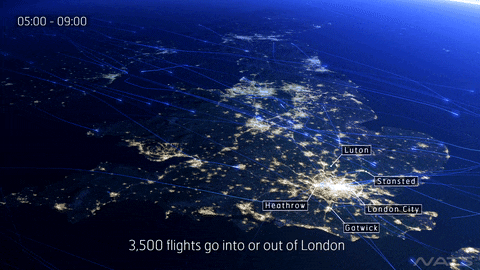Decarbonisation of aviation: Is the govt ignoring its own evidence on airport expansion?

The Government appears to ignore its own evidence when it comes to airport expansion and the decarbonisation of aviation.
The Net Zero Strategy published yesterday, highlights how difficult it is to decarbonise aviation and places heavy reliance on the development of ‘sustainable aviation fuels’.
The indicative transport pathway includes expected emissions reductions across transport of 76-86 per cent by 2050, including international aviation and shipping emissions.
International aviation and shipping emissions would need to fall by 12 per cent by 2035. Yet, the strategy contains limited policies for ensuring that these reduction targets can be met.
The announcement of £180m to support the development of SAF plants seems to be insufficient when a DfT commissioned report by Ricardo estimated the start-up cost of these plants to be around £600-700m.
To reach Government targets, it will require a significant increase in investment from the private sector, whose willingness is yet to be demonstrated.
Further, their strategy envisages SAF use constituting between – at very best – 5 per cent and 30 per cent of flights by 2050, thereby leaving the vast majority of flights still entirely reliant on kerosene.
Heathrow expansion
Current plans for a third runway at Heathrow would create 260,000 additional flights per year, or over 700 per day, with a large proportion of these flights long haul.
The Government have decided to revisit whether to review the Airports National Policy Statement, the policy enabling Heathrow expansion, when it publishes its plans for Jet Zero aviation, expected early next year.
In its response to the Climate Change Committee Progress Report, the Government appear to reject the CCC’s advice that a demand management framework will be required and assert that they can meet their net zero goals without directly intervening to limit growth.
However, the DfT’s own analysis, as published in the Jet Zero consultation shows that aviation will have residual emissions of some 21m in 2050, even if the highly speculative aspirations for new fuels and technology come to fruition.
Further, in a document published by the Department for Business, Energy and Industrial Strategy (BEIS), ‘Net Zero Principles for successful behaviour change initiatives’, it is actually acknowledged that there is a need to reduce frequent flying, limit airport expansion, and issue conditional bailouts to airlines.
This document also highlights how the Government should recognise “the hugely impactful signal it sends to, for example, approve airport expansions, or financially support the airline industry with little demands for decarbonisation in return”.
The Government’s response to the CCC’s advice appears to directly contradict this BEIS document, which, recently, appears to have been withdrawn from the BEIS website.